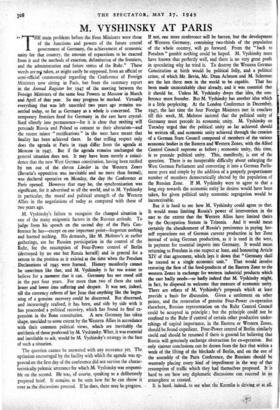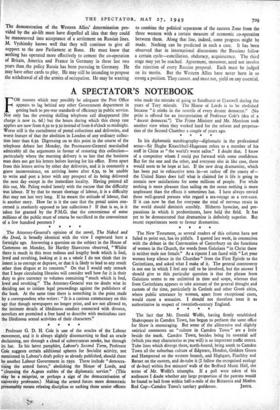M. VYSHINSKY AT PARIS
T << HE main problems before the Four Ministers were those of the functions and powers of the future central government of Germany, the achievement of economic unity for that country, the amount of reparations to be exacted from it and the methods of exaction, delimitation of the frontiers, and the administration and future status of the Ruhr." These words are new; taken, as might easily be supposed, from an official or semi-official communiqué regarding the Conference of Foreign Ministers now sitting in Paris, but from the summary report in the Annual Register for 1947 of the meeting between the Foreign Ministers of the same four Powers at Moscow in March and April of that year. So may progress be marked. Virtually everything that was left unsettled two years ago remains un- settled today, so far as Germany as a whole is concerned. The temporary frontiers fixed for Germany in the east have crystal- lised silently into permanence—for it is clear that nothing will persuade Russia and Poland to consent to their alteration—and the recent minor " rectifications " in the west have meant that finality has been achieved there. In that trifling respect only does the agenda at Paris in 1949 differ from the agenda at Moscow in 1947. But if the agenda remains unchanged the general situation does not. It may have been merely a coinci- dence that the new West German constitution, having been ratified by ten out of the eleven Lander in the Western Zones (Bavaria's opposition was inevitable and no more than formal), was declared operative on Monday, the day the Conference at Paris opened. However that may be, the synchronisation was significant, for it advertised to all the world, and to M. Vyshinsky in particular, the moral and political strength of the Western Allies in the negotiations of today as compared with those of two years ago.
M. Vyshinsky's failure to recognise the changed situation is one of the many enigmatic factors in the Russian attitude. To judge from his speech on the second day of the Paris Con- ference he has—except on one important point—forgotten nothing and learned nothing. His demands, like M. Molotov's at earlier gatherings, are for Russian participation in the control of the Ruhr, for the resumption of Four-Power control of Berlin (destroyed by no one but Russia herself) and in general for a return to the position as it existed at the time when the Potsdam Declarations of 1945 were framed. History manifestly cannot be unwritten like that, and M. Vyshinsky is far too astute to believe for a moment that it can. Germany has not stood still in the past four years. For more than two of them she sank lower and lower into suffering and despair. It was not, indeed, till the currency reform of last June that anything like the begin- ning of a genuine recovery could be discerned. But discerned, and increasingly realised, it has been, and side by side with it has proceeded a political recovery, which has found its final ex- pression in the Bonn constitution. A new Germany has taken shape, moulded to some extent by the Western Allies in accordance with their common political views, which are inevitably the antithesis of those professed by M. Vyshinsky. What, it was essential and inevitable to ask, would be M. Vyshinsky's strategy in the face of such a situation.
The question cannot be answered with any assurance yet. The optimism encouraged by the facility with which the agenda was ap- proved on the first day of the conference did not survive the charac- teristically polemic utterance for which M. Vyshinsky was responsi- ble on the second. He was, of course, speaking to a deliberately prepared brief. It remains to be seen how far he can throw it over as the discussions proceed. If he does, there may be progress. If not, one more conference will be barren, but the development of Western Germany, containing two-thirds of the population of the whole country, will go forward. From the " back to Potsdam " gambit nothing could be hoped. M. Vyshinsky must have known that perfectly well, and there is no very great profit in speculating why he tried it. To destroy the Western German Constitution at birth would be political folly, and a political crime, of which Mr. Bevin, Mr. Dean Acheson and M. Schuman are the last three men in the world to be capable. That has been made unmistakably clear already, and it was essential that it should be. Unless M. Vyshinsky drops that idea, the con- ference must founder. But M. Vyshinsky has another idea which is a little perplexing. At the London Conference in December, 1947, the last time the four Foreign Ministers met in conclave till this week, M. Molotov insisted that the political unity of Germany must precede its economic unity. M. Vyshinsky on Tuesday urged that the political unity so far achieved should be written off, and economic unity achieved through the creation of a German State Council composed of members of the various economic bodies in the Eastern and Western Zones, with the Allied Control Council supreme as before ; economic unity, this time.
is to precede political unity. This, manifestly, is out of the question. There is no insuperable difficulty about enlarging the West German Parliament and converting it into a German Parlia- ment pure and simple by the addition of a properly proportionate number of members democratically elected by the population of the Russian Zone. If M. Vyshinsky were to agree to that a long step towards the economic unity' he desires would have been taken, for given political unity economic segregation would be inconceivable.
But it is hard to see how M. Vyshinsky could agree to that. It would mean limiting Russia's power of intervention in the east to the extent that the Western Allies have limited theirs by the Occupation Statute in Trizonia. And it would mean certainly the abandonment of Russia's persistence in paying her- self reparations out of German current production in her Zone instead of using German production, as it is used in the west, in payment for essential imports into Germany. It would mean returning to Potsdam in one respect at least, and honouring Article XIV of that agreement, which lays it down that " Germany shall be treated as a single economic unit." That would involve restoring the flow of the food-products of the Eastern Zone to the western Zones in exchange for western industrial products which the east badly needs—so badly indeed that M. Vyshinsky might, in fact, be disposed to welcome that measure of economic unity.
There are others of M. Vyshinsky's proposals which at least provide a basis for discussion. Given a settlement on other points, and the restoration of genuine Four-Power co-operation elsewhere, Russian representation on the Ruhr Control Council could be accepted in principle ; but the principle could not be confined to the Ruhr if control of certain other productive under- takings of capital importance, in the Eastern or Western Zones, should be found expedient. Four-Power control of Berlin similarly could and should be resumed if there is ground for believing that Russia will genuinely exchange obstruction for co-operation. But only sinister conclusions can be drawn from the fact that within a week of the lifting of the blockade of Berlin, and on the eve of the assembly of the Paris Conference, the Russians should be wantonly placing every kind of impediment in the way of that resumption of traffic which they had themselves proposed. It is hard to see how any diplomatic discussions can succeed in an atmosphere so created. It is hard. indeed, to see what the Kremlin is drivialt, at at all. The demonstration of the Western Allies' determination pro- vided by the air-lift must have dispelled all idea that they could be manoeuvred into acceptance of a settlement on Russian lines. M. Vyshinsky knows well that they will continue to give all support to the new Parliament at Bonn. He must know that nothing has operated more effectively to cement the co-operation of Britain, America and France in Germany in these last two years than the policy Russia has been pursuing m Germany. He may have other cards to play. He may still be intending to propose the withdrawal of all the armies of occupation. He may be wanting to combine the political separation of the eastern Zone from the three western with a certain measure of economic co-operation between them. Along that line, indeed, some progress might be made. Nothing can be predicted in such a case. It has been observed that in international discussions the Russians follow a certain cycle—conciliation, obduracy, acquiescence. The third stage may yet be reached. Agreement, moreover, need not involve the rejection of every Russian proposal. Each must be judged on its merits. But the Western Allies have never been in so strong a position. They cannot, and must not, yield on any essential.







































 Previous page
Previous page